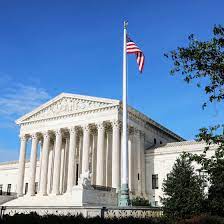Brianna Bellinghieri ‘22
Madeleine Ott ‘22
A case that can impact students’ First Amendment rights nationwide started in rural Pennsylvania. Now, the case is in full swing with oral arguments beginning April 28. The incident in question involves Brandi Levy, a former student at public high school in Mahanoy City, Pennsylvania. After not being selected for her school’s varsity cheer team, she posted a profane message on Snapchat venting her frustration with the school, which was eventually seen by her coach. Levy was banned from the team for a year and subsequently sued the school for violating her First Amendment right to freedom of speech, with a federal appeals court ruling in her favor in 2020. The Mahanoy Area School District violated Brandi Levy’s First Amendment rights by punishing her for an off-campus outburst that caused minimal damage.

This case sheds light on the ambiguous issue of a public school’s ability to restrict student speech outside of school grounds. History Department Chair Steven Schuh echoes this idea, “The bigger question in this case is if a public school can take punitive action or not.” Head of the Young Democrats Vince Vento ‘21 emphasizes the case’s momentous significance, saying, “I think that this case is incredibly important because if the court decides in favor of the school, they’ll be setting a limiting precedent on speech for generations to come. The court will have to analyze the situation critically especially because it is a public school.”
Levy’s First Amendment rights should still apply in her circumstance because her actions did not take place on school grounds. A key precedent is the 1969 Supreme Court case Tinker v. Des Moines Independent Community School District, in which the majority opinion stated that students don’t “shed their constitutional rights to freedom of speech or expression at the schoolhouse gate.” As Levy’s rant did not even happen on campus, her First Amendment rights should still apply. Head of Young Republicans Adam Oliva ‘21 agrees, stating, “Public schools are agents of the government so they shouldn’t be able to enforce restrictions on speech, especially outside of school, unless they present an imminent danger.”
Levy’s language does not cross into the realm of harmful or violent misconduct. In the aforementioned Supreme Court case, the majority determined that schools could only restrict free speech if it “materially and substantially” disrupted the school community and operation. Although the school justified Levy’s punishment by claiming to “avoid chaos” and preserve a “teamlike environment,” her language, albeit profane, was not particularly damaging and did not cause serious harm to the school or other individuals. Voicing frustration or a difference of opinion outside of school are not sufficient grounds for punishment. Vento agrees, “The school is in violation of her free speech.”
In addition, if students are not allowed to use free speech to express themselves or deal with their emotions in a healthy manner during their important developmental adolescence, they might turn to truly dangerous methods that may be both physically and mentally harmful to themselves and others. Levy should not be penalized for dealing with her frustration in a relatively safe manner. Justice Brett Kavanaugh believes that Levy’s punishment was unusually harsh and sympathizes with the teenager, sharing, “She’s competitive, she cares, she blew off steam like millions of other kids have when they’re disappointed about being cut from the high school team.”
There are certainly instances in which students’ actions on social media have genuinely caused harm to other people and institutions and warrant punishment. This, however, is not one of those cases. Brandi Levy and the rest of the nation now await the verdict of the Supreme Court, who will hand down a crucial decision that will help to define free speech, particularly in an increasingly digital society, for generations to come.